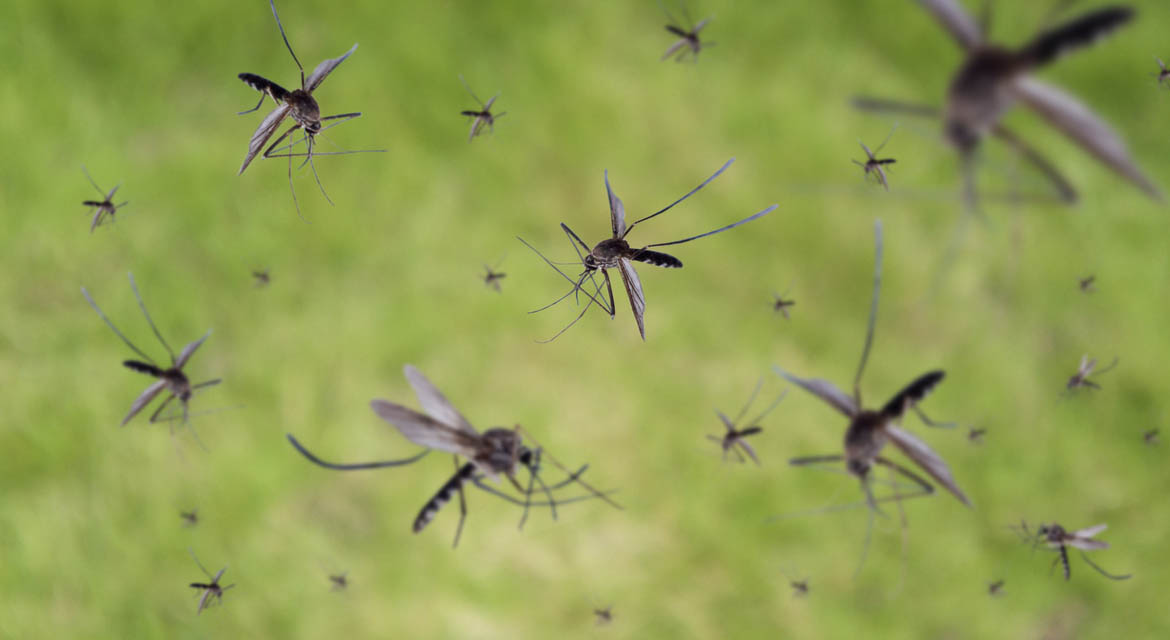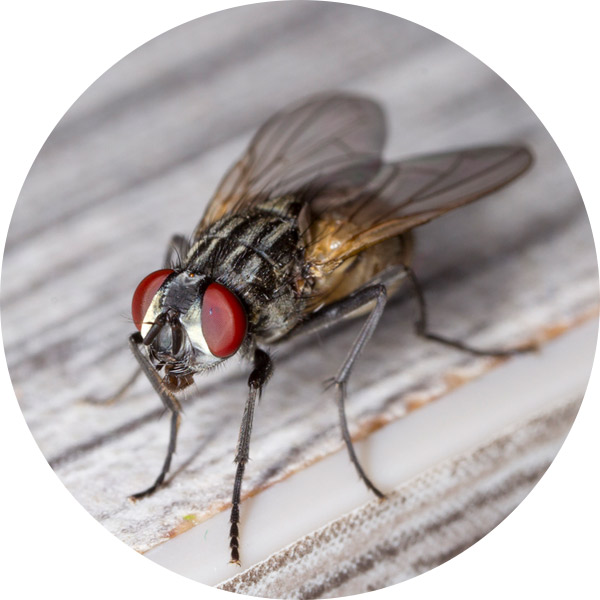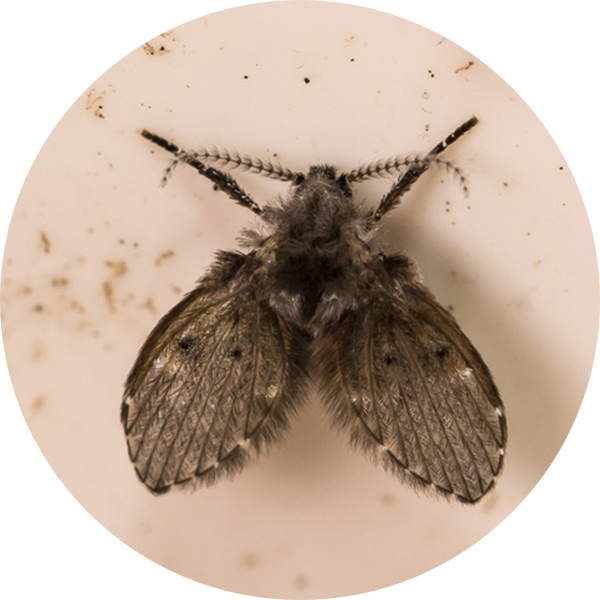
Mosquito Facts & Information
The concerns of a mosquito infestation at home include the potential spread of mosquito-borne diseases, the annoyance and discomfort caused by their bites, and the impact on outdoor activities and enjoyment of outdoor spaces.
Risks of Mosquitoes

Disease Transmission
Mosquitoes are known vectors for numerous diseases that can be transmitted to humans and animals through their bites. Some of the most notable mosquito-borne diseases include malaria, dengue fever, Zika virus, West Nile virus, and various types of encephalitis. These diseases can cause severe illness, long-term health complications, and, in some cases, even death. Controlling mosquito populations is crucial for minimizing the risk of disease transmission and protecting public health.

Disruption of Outdoor Activities
Mosquitoes can significantly disrupt outdoor activities, particularly during warm seasons or in areas with high mosquito populations. Mosquitoes are most active during dawn and dusk, coinciding with times when people often engage in outdoor recreational activities or gatherings. The constant presence of mosquitoes and their persistent biting can make it uncomfortable or unpleasant to spend time outdoors, impacting leisure activities, sports events, or social gatherings.
Breeding and Population Growth
Mosquitoes require water sources for breeding, and their populations can multiply rapidly in suitable environments. Stagnant water in various forms, such as puddles, ponds, or containers, can serve as breeding grounds for mosquito larvae. Large mosquito populations can create a continuous cycle of infestation, making it challenging to control their numbers effectively. Addressing stagnant water sources and implementing mosquito control measures are crucial for interrupting their breeding cycle and reducing their population.
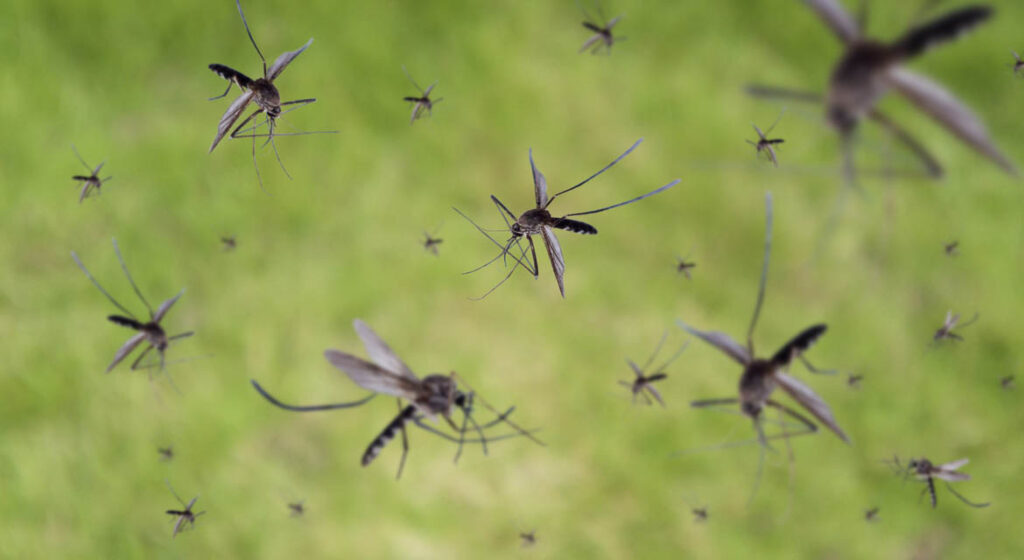
Truly Nolen GUARANTEE
If you’re not completely satisfied, you’ll get a full refund on your most recent service with our 100% money back guarantee.
Common Species of Mosquitoes
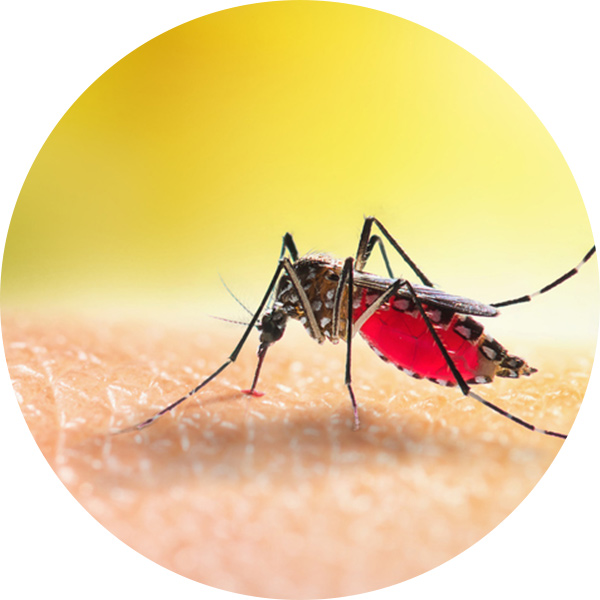
Aedes Mosquitoes
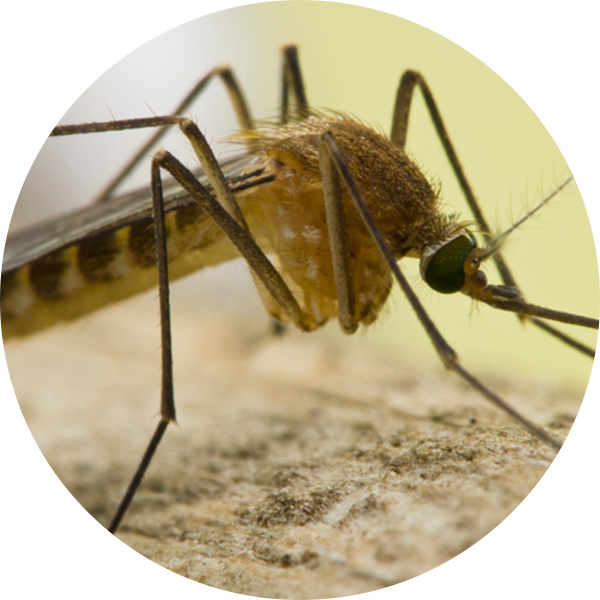
Culex Mosquitoes
How To Identify Mosquitoes
Mosquitoes can be identified by their small size, slender bodies, long legs, and the presence of two wings. To identify a mosquito infestation at home, look for a significant increase in mosquito activity both indoors and outdoors, the presence of adult mosquitoes resting on walls or ceilings, and the occurrence of mosquito bites on humans or pets.
Mosquito Appearance
Mosquitoes are small, slender insects with a wingspan ranging from 2 to 3 centimeters. They have a distinctive long proboscis (mouthpart) that they use to feed on the blood of vertebrates. Mosquitoes have two pairs of wings and long, delicate legs. The body is usually covered in fine scales, and their coloration can vary from gray to brown or black.
Mosquito Habitat
Mosquitoes are found worldwide, except in extremely cold regions. They inhabit various habitats, including freshwater environments such as ponds, lakes, swamps, and slow-moving streams. Some species can tolerate brackish water, and a few even breed in saltwater marshes. Mosquito larvae develop in standing water sources, while adults typically rest in vegetation or other shady areas.
Mosquito Diet
Female mosquitoes feed on the blood of humans and other animals to obtain the necessary nutrients for egg development. Males, on the other hand, primarily feed on plant nectar and other sugary substances. Nectar provides the energy required for flight and other metabolic activities. However, both male and female mosquitoes also consume plant juices and other fluids for nourishment.
Mosquito Behavior
Mosquitoes are most active during dawn and dusk but can be active at any time of the day, depending on the species. They are highly attracted to carbon dioxide, heat, and body odor emitted by their hosts. Female mosquitoes locate their hosts by detecting these chemical cues. Mosquitoes are capable of flying over significant distances, although some species have more limited flight ranges.
Mosquito Reproduction
Female mosquitoes lay their eggs on the surface of standing water or in areas prone to flooding. The eggs hatch into larvae, commonly known as wigglers or wrigglers, which live in water and feed on organic matter. Mosquito larvae go through several stages of growth (instars) before transforming into pupae. Pupae do not feed and undergo metamorphosis inside a protective cocoon. After emerging as adults, male mosquitoes live for about one to two weeks, while females can live several weeks to several months, depending on the species.
Mosquito Prevention
Preventing mosquito infestations primarily involves reducing their breeding sites and minimizing exposure to bites. This can be achieved by eliminating or treating standing water sources, such as emptying containers, unclogging drains, and properly maintaining swimming pools. Using mosquito repellents containing DEET, wearing protective clothing, and installing window screens can help prevent bites. Mosquito control programs may include larval control measures, such as applying larvicides to breeding sites, and adult control methods, such as using insecticides or mosquito traps.

$50 Off Year Round Pest Control
Truly Nolen is a family-owned company with 85 years of experience providing the best pest control. If you’re not completely satisfied, you’ll get a full refund on your most recent service with our 100% money back guarantee.
The Truly Nolen Approach
Environmentally Conscious
We work to minimize our impact on the environment by using naturally occurring materials whenever possible.
Pet Friendly
Truly Nolen uses an Integrated Pest Management (IPM) approach designed with your pets in mind.
100% Money Back Guarantee
If you’re not completely satisfied, you’ll receive a full refund on your most recent service.
How Truly Nolen Gets Rid of Mosquitoes
Truly Nolen’s process for treating a mosquito infestation typically involves a comprehensive approach. They start with a thorough inspection to identify breeding sites and areas where mosquitoes are active. Then, they may implement measures to eliminate or treat standing water sources, such as ponds, bird baths, or clogged gutters. Additionally, they may use targeted mosquito control treatments, such as residual sprays or larvicides, in areas where mosquitoes are found. Ongoing monitoring and follow-up visits may be conducted to ensure the effectiveness of the treatment and make further adjustments if needed.
Frequently Asked Questions
How can I reduce the presence of mosquitoes in my yard?
To reduce the presence of mosquitoes in your yard, eliminate standing water sources where mosquitoes breed, such as flower pots, birdbaths, or clogged gutters; use mosquito repellents when spending time outdoors; install screens on windows and doors; and consider using mosquito control products like insecticide sprays or mosquito traps. Learn More!
How long do mosquitoes live?
The lifespan of a mosquito varies depending on the species, but generally, adult mosquitoes live for a few weeks to a couple of months. Female mosquitoes typically have a shorter lifespan than males as they often die after laying their eggs.
Do all mosquitoes transmit diseases?
No, not all mosquitoes transmit diseases. However, certain species of mosquitoes, such as Aedes aegypti and Anopheles mosquitoes, are known vectors for diseases like dengue, Zika, malaria, and West Nile virus. It is important to take precautions to prevent mosquito bites, especially in areas where mosquito-borne diseases are prevalent. Learn More!
What are effective methods to prevent mosquito bites?
Effective methods to prevent mosquito bites include wearing long sleeves and pants, using mosquito repellents containing DEET or other recommended ingredients, staying indoors during peak mosquito activity times (dawn and dusk), and using mosquito nets or screens to create a barrier between you and mosquitoes.
Can mosquitoes breed indoors?
Yes, mosquitoes can breed indoors if there are suitable breeding sites with stagnant water available. Common indoor breeding sites include flower vases, indoor plants with water trays, and containers holding water. It’s important to eliminate or regularly empty and clean such water sources to prevent mosquito breeding indoors.

